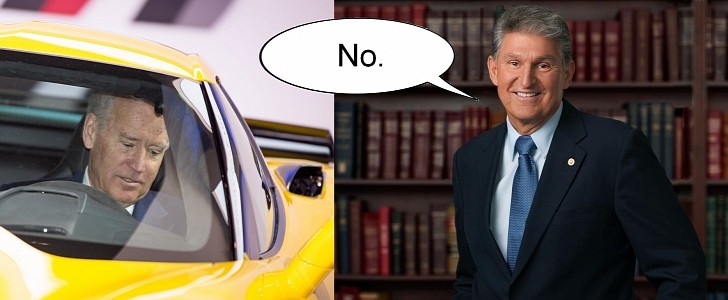The U.S. government wanted to offer a $4,500 incentive for electric cars made by unionized workers as part of the Build Back Better Act. As we mentioned in December 2021, it would not be something easy to approve when Joe Biden faced opposition from Democrat senators such as Joe Manchin. The West Virginia senator told Bloomberg that the union-based EV tax credit is “gone,” which was more than predictable.
Apart from the friendly fire, the $4,500 credit was fiercely opposed by companies without unionized factories in the U.S., such as Tesla, Honda, and Toyota. They claimed that it would create an artificial benefit and impose unionizing even in factories that freely decided against it.
The idea would also create massive legal embarrassments for the American government. Mexican and Canadian products made in factories with unionized workers would not be eligible, which would go against the USMCA deal – the revised version of the NAFTA free-trade agreement. On December 2, 2021, Mexican Economy minister Tatiana Clouthier said the idea was “totally contrary to free trade” and promised to impose tariffs should it be approved.
That was not the only international reaction the idea brought up. South Korea and Germany pledged to go to the World Trade Organization (WTO) to attack the idea and eventually land the U.S. with penalties for hurting international trade. In fact, any country exporting electric vehicles to the American market would probably join them in this dispute.
The stillborn idea was apparently abandoned due to all the implications it would bring. However, that does not mean that the current federal incentives for electric vehicles will remain as they are. Manchin told Bloomberg that it is now penalizing American companies that reached the 200,000 unit quota and allowing foreign automakers to have a competitive advantage against them.
When the Build Back Better Act revises these credits, EV incentives will probably be limited in price and family income. First, the H.R. 5376 wanted to establish price barriers at $54,000 for vans, $55,000 for sedans, $69,000 for SUVs and crossovers, and $74,000 for pickup trucks. Only individuals making up to $400,000 per year, heads of households earning less than $600,000/year, or joint fillers not exceeding $800,000 would be eligible for the credit.
In August 2021, the U.S. Senate approved a non-binding amendment that lowered those values to $40,000 for all vehicles and the personal income restraint to $100,000 per year. Most electric pickup trucks would be excluded from such incentives, which suggests the discussions to reach a final text will extend for a lot more time. What we know for sure at this point is that the union-based EV tax credit is dead – and rightfully so.
The idea would also create massive legal embarrassments for the American government. Mexican and Canadian products made in factories with unionized workers would not be eligible, which would go against the USMCA deal – the revised version of the NAFTA free-trade agreement. On December 2, 2021, Mexican Economy minister Tatiana Clouthier said the idea was “totally contrary to free trade” and promised to impose tariffs should it be approved.
That was not the only international reaction the idea brought up. South Korea and Germany pledged to go to the World Trade Organization (WTO) to attack the idea and eventually land the U.S. with penalties for hurting international trade. In fact, any country exporting electric vehicles to the American market would probably join them in this dispute.
The stillborn idea was apparently abandoned due to all the implications it would bring. However, that does not mean that the current federal incentives for electric vehicles will remain as they are. Manchin told Bloomberg that it is now penalizing American companies that reached the 200,000 unit quota and allowing foreign automakers to have a competitive advantage against them.
When the Build Back Better Act revises these credits, EV incentives will probably be limited in price and family income. First, the H.R. 5376 wanted to establish price barriers at $54,000 for vans, $55,000 for sedans, $69,000 for SUVs and crossovers, and $74,000 for pickup trucks. Only individuals making up to $400,000 per year, heads of households earning less than $600,000/year, or joint fillers not exceeding $800,000 would be eligible for the credit.
In August 2021, the U.S. Senate approved a non-binding amendment that lowered those values to $40,000 for all vehicles and the personal income restraint to $100,000 per year. Most electric pickup trucks would be excluded from such incentives, which suggests the discussions to reach a final text will extend for a lot more time. What we know for sure at this point is that the union-based EV tax credit is dead – and rightfully so.













